- Home
- Jasper Fforde
The Song of the Quarkbeast: Last Dragonslayer: Book Two Page 8
The Song of the Quarkbeast: Last Dragonslayer: Book Two Read online
Page 8
‘What?’
‘You’re a foundling. You don’t know what your name is.’
‘It could be Jennifer Strange,’ I said, unconvincingly, ‘as a sort of coincidence.’
‘It doesn’t seem very likely.’
‘Perhaps not. But listen, you’re going to pass, right?’
And I took his hand and squeezed it, and smiled at him, and he smiled back.
‘Thanks.’
‘Miss Strange?’ said the secretary again. ‘The King’s Useless Brother has become bored and will see you early.’
Perkins and I straightened our clothes and followed the secretary into a high-ceilinged room decorated in the ‘medieval dreary chic’ style that was then very much in fashion. A lot of stone, tapestries on the walls and a stylish cold draught that caught you in the small of the neck like the onset of pneumonia.
Sitting behind a large desk that was full of shiny executive desk toys was the King’s Useless Brother: a thin, weedy man with a constantly dripping nose that he dabbed with annoying regularity with a handkerchief.
‘Good afternoon, Your Gracious Uselessness,’ I said, bowing low. ‘I am Jennifer Strange of the Kazam House of Enchantments. I humbly beg to set before you an application for my client Perkins Archibald Perkins to be licensed to commit enchantments in the worthy Kingdom of Snodd.’
‘Eh?’ he said, so I said the same thing again, only this time much more slowly. When I had finished he thought for a moment and then said:
‘You want a magic licence?’
‘Yes.’
‘Then why didn’t you just say so? All that “gracious this” and “humbly beg” makes my head spin. I wish people would say what they want rather than hiding it in long words. Honestly, if we got rid of any word longer than eight letters, life would be a lot more understandable.’
‘Except you wouldn’t have been able to say “understandable”,’ pointed out Perkins.
The King’s Useless Brother thought carefully and counted on his fingers.
‘How right you are!’ he announced at length. ‘What were we talking about?’
‘A magic licence application?’
‘Of course. But tell me one thing before we look at the application.’
‘Yes?’ I asked, expecting to be quizzed about Perkins’ fitness to serve, and whether he would uphold the noble calling with every atom of his being, that sort of thing.
‘How can you be called Perkins Perkins?’
‘My father’s name was Perkins, and I’m named after him. It’s like Adam Adams or David Davies.’
‘Or William Williams,’ I added.
‘Who’s he?’
‘Someone I just made up.’
‘Oh,’ said the Useless Brother, sniffing. ‘Right. What happens now?’
I took a deep breath.
‘I explain exactly why Mr Perkins should receive a licence, and upon your approval, we turn to appendix F of the Magic Enactments Licensing Act of 1867 and conduct one spell each from Group “A” through to Group “G”. Afterwards, once opposition voices are heard, Mr Perkins performs his Great Feat. You then decide upon the merits of the case and stamp the application into authority . . . or not.’
‘Stamp?’
His attention, which had been drifting somewhat, was suddenly renewed.
‘I have a number of stamps for all different purposes – look.’
He jumped off his chair and opened a cupboard behind the desk. It was full of rubber stamps. Big ones, small ones, each elegantly made and presumably to enact some sort of legislation for which the Useless Brother had been made responsible.
‘This is the one we will use today,’ he said, selecting a large and ornately handled rubber stamp that was the size of a grapefruit. ‘It carries two colours on a single stamp, which is a remarkable achievement, don’t you think? Now, where do I stamp it?’
Perkins and I looked at one another. This was turning out to be much easier than we had thought.
‘Don’t you want to see Cadet Perkins perform his Great Feat at the very least?’ I asked. ‘Or even have the adjudicator present?’
‘Oh, I’m sure he’ll be fine,’ said the King’s Useless Brother dismissively, staring at the stamp lovingly. I shrugged. The stamp made it all legal, and we’d be fools to pass up such an easy opportunity.
‘Just here,’ I said, passing the application across the table.
‘This is the bit I like,’ said the bureaucrat excitedly, ‘there’s nothing quite like the satisfying thump of a rubber stamp on paper. The sound of freedom, don’t you think?’
And so saying, he opened a jewel-encrusted pad, reverentially inked the stamp, brought it up above his head, paused for a moment and—
‘One moment, sire.’
Two men had just walked in. The most important of them was Lord Tenbury, one of the King’s most trusted advisers, and the Useless Brother’s business partner. He was a man dressed in the robes of high office and wore a finely combed grey beard and hair that framed his piercing eyes, also grey. I had met him on a number of occasions and he always left me with the impression that he was an iron fist in a kid-leather glove. Pleasant on the surface, but too smart and savvy for it to be possible to get much past him, and loyal to the Crown through and through – and not averse to making a few sacks of cash on the side.
‘My Gracious Lord,’ exclaimed Tenbury in an exasperated tone. ‘What did we say about stamping things when I’m out of the room?’
‘Sorry,’ said the Useless Brother, looking bored, ‘but she seemed so nice and that person there has the same name as his last name.’
‘Perkins,’ said Perkins helpfully.
‘I see,’ said Tenbury, looking at us both suspiciously. ‘And why are you here before your allotted time?’
‘We were invited in,’ I said.
‘That’s true,’ said the Useless Brother. ‘It gets very lonely in here sometimes with no stamping to do.’
‘You could always look out of the window.’
‘Of course I can’t, silly,’ scolded the Useless Brother. ‘If I did that all morning I’d have nothing to do in the afternoon.’
‘Very well,’ said Tenbury with a sigh, ‘have we seen the mandatory magic demonstrations or heard opposition statements?’
The Useless Brother frowned.
‘Opposition . . . what?’
‘Have we?’ asked Tenbury, looking at me.
‘No, sir, although we did ask. His Uselessness waived the normal procedure—’
‘Then I must with all haste reinstate it,’ interrupted Tenbury. ‘I am sure you appreciate the importance of protocol and procedure, not to mention the possibility of falling foul of King Snodd’s “No Hoodwinking of Simpletons” Law, specifically enacted for his brother?’
‘My apologies, sir,’ I said bowing low, ‘I meant no disrespect.’
Tenbury smiled, and did so with considerable charm. It would be easy to trust him, and that would be one’s first and last mistake. Unlike King Snodd and his mediocre dignitaries with their false charm, Tenbury was actually quite good at it. I could imagine him saying ‘terribly sorry about this, old boy’ as he put someone on the rack.
‘But first,’ he continued, ‘pleasantries. Good afternoon, Miss Strange.’
I bobbed politely.
‘Good afternoon, your Grace. May I present Cadet Perkins Perkins, here to apply for a licence to perform magic? Cadet Perkins, this is Lord Tenbury, the King’s Chief Adviser.’
‘Good afternoon,’ said Tenbury with a smile, shaking Perkins’ hands, ‘so good of you to come. I expect you know this much-respected citizen?’
He indicated the man who had walked in with him. He was dressed all in black. Not the long flowing gowns of old wizidrical tradition, but a sharply tailored suit complete with black shirt, black tie, socks, shoes and, if the rumours were correct, underwear. He was a lean man in his early fifties with greying hair dyed black, a carefully coiffured goatee and upswept eyebrows that he
had trained to work independently of one another for increased dramatic effect. He also had the annoying habit of keeping his chin high, so he had the appearance – if you were shorter, which most people were – of someone looking down his nose at you.
It was the Amazing Conrad Blix, chief wizard and managing director of iMagic.
We looked at one another coldly. The disdain wasn’t just mine, it was universal. Blix thought it was because his grandfather had been the much-hated Blix the Hideously Barbarous and we were being needlessly prejudiced over his power-mad descendant, but the truth was more prosaic: he just wasn’t very likeable.
‘Have trouble with a spell this morning?’ he asked.
I hoped my consternation didn’t show.
‘What makes you say that?’
‘Several blips on the Shandargraph that were centred on Zambini Towers,’ he said, ‘One large dip at eleven fifteen that you kindly warned me about, several more ten minutes later, a pause and then a massive drain that almost flatlined the trace. It looked suspiciously like somebody got into trouble, and another tried to reverse it. They failed and then everyone tried together. Yes?’
He was entirely correct.
‘Not at all,’ I replied, ‘we were simply limbering up for the bridge gig on Friday. There’ll be some heavy lifting to do, and Patrick of Ludlow can’t be expected to shoulder all the work on his own.’
I could see Blix didn’t believe me, but I had other things on my mind. Not least, why was Blix buddying up with Lord Tenbury? I smelled a rat, and suspected it would not be long in making an appearance.
‘We haven’t met,’ said Blix to Perkins, so I apologised and introduced them.
‘I humble myself in your presence, sire,’ said Perkins politely, for irrespective of how you viewed him, Blix was still a skilled practitioner. ‘I saw you a few years back levijuggling1 thirty-two billiard balls. Each in entirely separate orbits and speeds. It was quite something.’
‘Too kind,’ replied Blix with a bow.
‘That’s enough preamble,’ said Lord Tenbury, ‘and with His Eminence Ruprecht Sawduzt Snodd’s approval, we should look at Mr Perkins’ application.’
‘Who?’ asked Blix and I, almost at the same time, and Tenbury pointed at the King’s Useless Brother, who was doodling absently on the blotter.
‘Oh,’ we said, not considering that he even had a name.
Lord Tenbury pressed a button on the intercom and asked for Miss Smith to be sent in. I saw Blix stiffen when Tenbury mentioned her name, and I felt my pulse quicken, too. The door opened and an upright woman in early middle age with a shock of white hair walked in. Her eyes were so dark they seemed empty, and an undefinable damp silence of the sort you get in caves moved in with her.
‘Thank you – um – for joining us, Miss Smith,’ said Tenbury, shivering as he spoke.
‘Right,’ she replied, glaring at Blix with her dark eyes so savagely I saw the colour drain from his cheeks.
This was Miss Boolean Smith, once known as ‘the Magnificent Boo’ and a powerful independent sorceress of considerable talents until kidnapped by anti-magic extremists. She had never practised again following her release, nor revealed why. The only time she did anything related to magic was in her usual job as Beastmaster, and at times like this: she was Infernal Affairs’ nominated adjudicator, and would ensure that no trickery influenced Perkins’ practical demonstrations. It would be simplicity itself to have another wizard outside doing spells on Perkins’ account, or even a disgruntled wizard attempting to thwart Perkins with a jam, and Boo was there to detect any chicanery.
‘It is with much pleasure that I meet you again,’ I said, since we had spoken occasionally on the subject of Quarkbeasts, on which she was an expert. ‘May I present Cadet Perkins?’
The Once Magnificent Boo glared at Cadet Perkins but did not shake his outstretched hand. She never did – not with anyone.
‘I am much honoured,’ said Perkins, trying to avoid her jet-black eyes.
‘Then you honour too easily,’ she replied before turning to Blix. ‘Still drowning puppies, Conrad?’
‘That was never proved,’ replied Blix as the temperature in the room lowered another two degrees.
‘Pleasantries are over,’ said Tenbury nervously, ‘The paperwork, if you please, Miss Strange.’
I presented the paperwork to Ruprecht, who stared at it absently for a few seconds before Tenbury checked it and then passed it to Once Magnificent Boo, who grunted her approval.
‘You may proceed,’ said Tenbury.
‘This is my chosen spell from Group “A”,’ announced Perkins, as the Useless Brother and the chair he was sitting in elevated several feet, rotated once slowly, and then settled back down again.
‘Gosh,’ said the Useless Brother.
‘Accepted,’ said Boo.
Over the next twenty minutes, Perkins undertook several other acts of enchantment, which by their variety and scope demonstrated his understanding of the arts. He changed the colour of water in a jug to blue, made a light bulb glow without wires, and took off his own T-shirt without removing his shirt, which, while sounding easy, is actually one of the hardest to do in Group ‘C’. In fact, he managed all of the tasks without a problem and to Boo’s approval, and after several more assorted enchantments we were ready to hear any arguments opposing his application. This is where I expected Blix to drum up some technicality and block us, perhaps in retaliation for our observation that iMagic’s Samantha Flynt was less than perfect when doing her magic feats, and conducting the test in a swimsuit was pointless and demeaning to the profession and women in general. He could have tried to block us, but he didn’t.
‘We have no objections to Mr Perkins’ application.’
This was suspicious – mostly because that’s what any reasonable person might have said, and Blix was rarely, if ever, reasonable.
Perkins was now ready to undertake his last act of sorcery, which was to be a Class Six enchantment of one’s own invention that ‘was to show originality, flair, and must be between one and three thousand Shandars’.
‘For my final enchantment,’ declared Perkins, ‘I will set distant dogs barking.’
‘What?’ said the Useless Brother. ‘That’s it? This is most unsatisfactory. I was hoping for a shower of mice or conjuring up a marshmallow the size of my head or something.’
‘It does sound a bit . . easy,’ added Lord Tenbury.
‘I concur that it sounds lame,’ said Perkins, ‘but making distant dogs bark is a spell of considerable subtlety that combines distance, canine mind control and pinpoint selectivity.’
‘Cadet Perkins is correct,’ said Once Magnificent Boo quietly, ‘the test is valid.’
‘Very well,’ said Lord Tenbury. ‘Proceed.’
‘Yes,’ said the Useless Brother. ‘Proceed.’
We stepped out on to the ramparts outside the Ministry of Infernal Affairs office, a section of flat lead roof on the high outer wall of the castle. Eight storeys below us was the inner courtyard, and from our lofty perch we could see the Dragonlands, a vast tract of unspoiled land, untrod by humans for over four centuries and now home to the only two Dragons on the planet, Feldspar Axiom Firebreath IV, and Colin.2
‘Ladies and gentlemen,’ began Perkins, ‘for this test I will set four distant and very separate dogs barking. But to dispel the notion of chance, you may choose the direction from which the dogs are to bark, and the size of the dog.’
‘Can I choose first?’ asked the Useless Brother, who was suddenly interested.
‘Of course,’ said Lord Tenbury, ‘you are the Minister of Infernal Affairs, after all.’
‘I am, aren’t I?’ Ruprecht said, pleased with himself, looking out over the battlements and waving a finger in the direction of the kitchens. ‘I choose a chihuahua, and from over there.’
Perkins concentrated for a moment, and pointed two fingers in the direction Ruprecht had indicated. Almost immediately, there came the sharp bark o
f a small dog, somewhere quite far away, and from the direction he had indicated.
‘That’s one,’ said Boo.
‘A Great Dane,’ said Blix, ‘from there.’
A moment later, there came the unmistakable deep, gruff tones of a large dog. The sound was so distant that if there had not been a breeze to bring it to our ears, we may not have heard it at all. Perkins was doing well, and the bark of a cocker spaniel next up was a similarly expert piece of spelling. If it had been any closer it would not have been distant, and if it had been ten feet farther away, we would not have heard it at all.
‘A bull terrier,’ I said, for it was my turn to choose the final dog, ‘from over there.’
Perkins was relaxed and on a roll. His magic licence was in the bag. Nothing, I thought, could stop us now. He had raised his index fingers to cast his final spell when there was a sharp cough from behind us. We turned to find a footman dressed in full livery with embroidered jacket, tight red breeches, stockings and a wig. He held a staff which he struck twice on the ground, announcing in a shrill voice:
‘His Gracious Majesty, King Snodd IV!’
* * *
1 A mixture of levitation and juggling. Although not of any huge practical use, it is a measure of a practitioner’s skill. To levitate one or ten objects is easy; to make them all do different things when in the air takes considerable power and concentration. The Mighty Shandar could reputedly also do Blix’s trick but with bison. Remarkable to behold, but what the bison thought about it was not recorded. Owing to constraints within the ARAMAIC-128 notation required in the enchantment, thirty-two objects is the maximum anyone can work with.
2 Colin is the smaller of the two if you ever meet. At the time of the events surrounding the bridge gig they were spending a fortnight in Washington, DC, reading the entire literary output of mankind at the Library of Congress, in order to better understand the species. They thought it ‘in general a charming read, but tending towards monotony’. This is the principal reason they do not feature in this story.
King Snodd IV

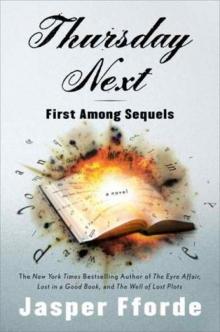 First Among Sequels
First Among Sequels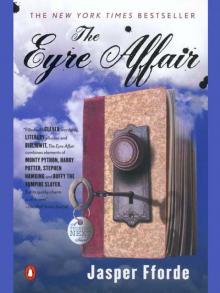 The Eyre Affair
The Eyre Affair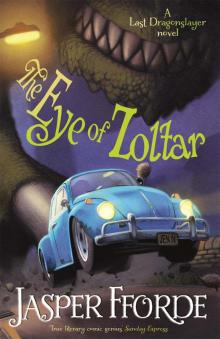 The Eye of Zoltar
The Eye of Zoltar The Woman Who Died a Lot
The Woman Who Died a Lot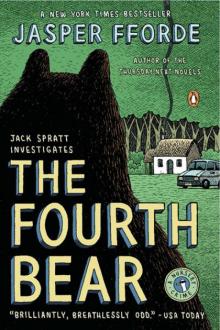 The Fourth Bear
The Fourth Bear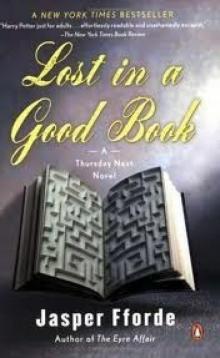 Lost in a Good Book
Lost in a Good Book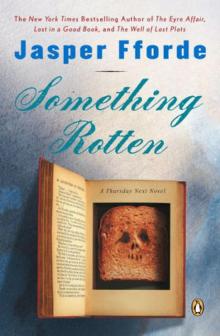 Something Rotten
Something Rotten The Well of Lost Plots
The Well of Lost Plots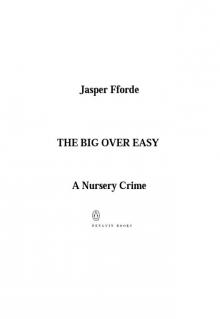 The Big Over Easy
The Big Over Easy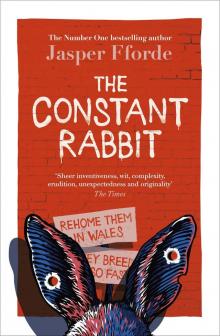 The Constant Rabbit
The Constant Rabbit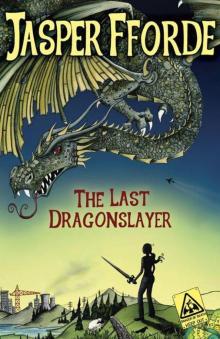 The Last Dragonslayer
The Last Dragonslayer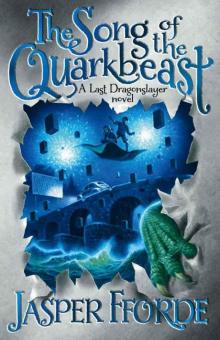 The Song of the Quarkbeast
The Song of the Quarkbeast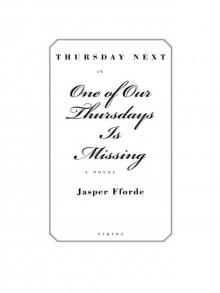 One of Our Thursdays Is Missing
One of Our Thursdays Is Missing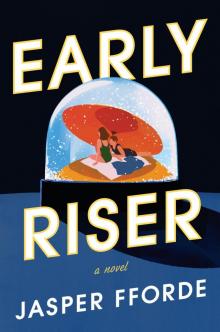 Early Riser
Early Riser Early Riser_The new standalone novel from the Number One bestselling author
Early Riser_The new standalone novel from the Number One bestselling author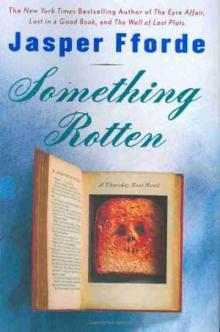 Something rotten n-4
Something rotten n-4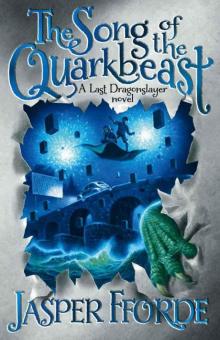 The Song of the Quarkbeast tld-2
The Song of the Quarkbeast tld-2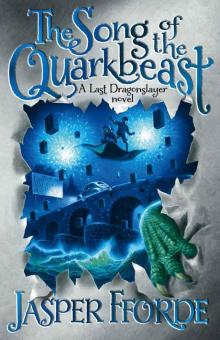 The Song of the Quarkbeast: Last Dragonslayer: Book Two
The Song of the Quarkbeast: Last Dragonslayer: Book Two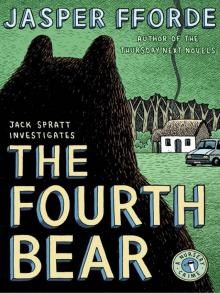 The Fourth Bear nc-2
The Fourth Bear nc-2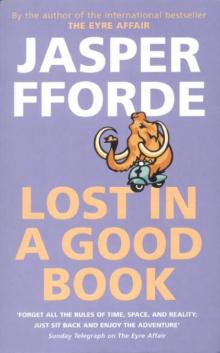 Lost in a Good Book tn-2
Lost in a Good Book tn-2 The Well of Lost Plots n-3
The Well of Lost Plots n-3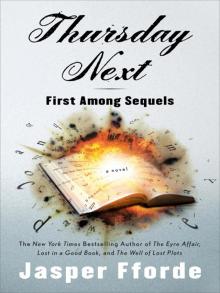 Thursday Next in First Among Sequels
Thursday Next in First Among Sequels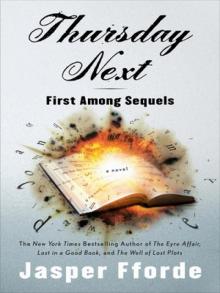 First Among Sequels tn-5
First Among Sequels tn-5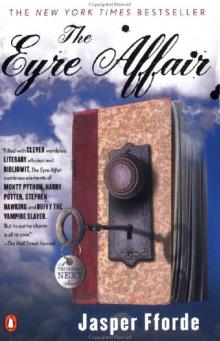 The Eyre Affair tn-1
The Eyre Affair tn-1